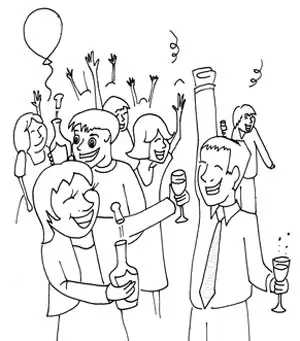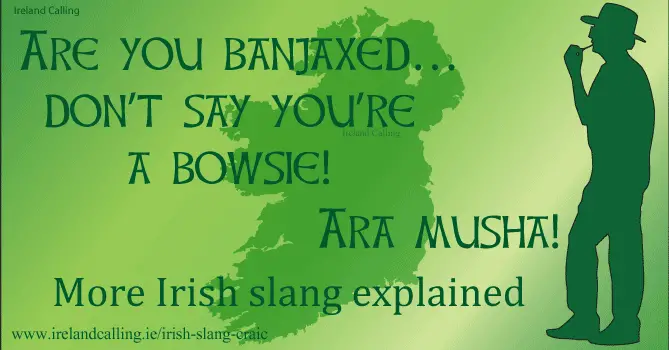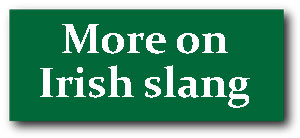Learning Irish doesn’t necessarily mean Gaelic…there’s also rich variety of expressions used to liven up everyday speech in English.
Dictionaries aren’t always very helpful, but here’s our second collection of colourful words to be found in everyday conversations in Ireland.
Banjaxed
Broken, shattered ruined. As in: “I can’t fix my car, it’s completely banjaxed.” It can also refer to being extremely tired, as in: “I’ve been working non-stop and I’m completely banjaxed.”
The craic was 90
A fantastic, brilliant time. The craic, pronounced crack, refers to the laughter and banter that goes with having a good night out with friends.

If the craic was 90 then it means it was exceptionally good and you were having the time of your life.
The phrase became well known from the late sixties onwards because of the song, the Craic was 90 on the Isle of Man, which was recorded by top Irish artists like Paddy Reilly and Christy Moore.
Ara
An exclamation, meaning well, or oh well, what can you do? It’s sometimes pronounced as one syallable – ar.
It can be used on its own or combined with words like sure or musha (see below). It’s often used when considering a problem to which there’s no satisfactory answer. For example:
“Oh no, it’s raining and the children want to go to the beach.”
“Ara sure… (what can you do?)”
Holy show
Embarrassing spectacle. As in: “He got drunk and made a holy show of us.” It’s often used by mothers talking to their children, as in: “Don’t go to school in that dirty shirt, you’ll make a holy show of us.”
Quare
Comes from a local pronunciation of queer. It has nothing to do with the dismissive word for gay, as sometimes used in other countries.
It’s mostly used to mean very, as in saying a show was “quare good”. It can also mean odd or strange.
The term is probably best known outside Ireland through Brendan Behan’s play, The Quare Fellah, which features a central character around whom everything revolves even though he is never seen or heard.
Musha
Multipurpose word that can be used in almost any sentence to mean ‘ah well’, ‘oh well’ etc. Usually said at the start of a sentence. It can signal surprise or annoyance: “Musha, why did you throw in your fine job?” Or it can be surprise and delight: “Ara musha, it’s so good to see you.”
It can suggest a sense of resignation: “Musha, there’s no talking to him…he thinks he knows everything.”
It can be combined with ara (see above) for extra emphasis. “Ara musha, why did you do that?”
Musha is used in the film The Quiet Man but is probably best known outside Ireland through its use in the song Whiskey in the Jar, recorded by a variety or artists from the Dubliners to Thin Lizzy and even Metallica. “Musha ring dum a dooram a dah…”
Hape
A rural pronunciation of heap It means a lot, an excessive amount: “I’ve a hape of work today.”
Bowsie
A lazy, good for nothing person who won’t work or help. It features in the song, The Auld Triangle, written by Brendan Behan for his play, The Quare Fellah, which is set in a prison. The song has been recorded by numerous artists including the Dubliners and the Pogues.
“To start the morning,
“The screw was bawlin,
“Get up you bowsie and clean out your cell.”
Suckin diesel
Things have improved and are going well now. The phrase is popular in the north of Ireland. It’s mostly used in situations where some problem stops you doing something, you find a solution and then everything improves dramatically.
For example: you’re stuck in a traffic jam for an hour barely moving, suddenly it clears and you’re speeding away at last, you turn to your friend and say: “Ah we’re sucking diesel now.”
Go ‘way out o’ that
Expression of shock, surprise, disbelief. If someone tells you something extraordinary, or you think they might be kidding you or trying to hoodwink you, then you might reply: “Ah go ‘way out o’ that.”
I will ya
This means exactly the opposite of what you might think. “I will ya” means “I definitely will not”. It’s often laced with heavy sarcasm.
“Will you give me your life savings?”
“I will ya!”
Of course all regions of Ireland have their own unique slang words and phrases, which can sometimes even sound strange to people of their neighbouring counties. Click the link below for a video of the Cork and Kerry men who became a bit of an internet sensation as the men with Irish accents so strong, even the Irish can’t understand them.

